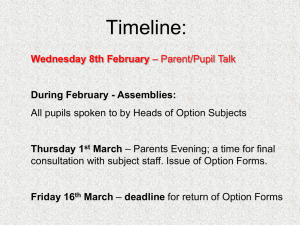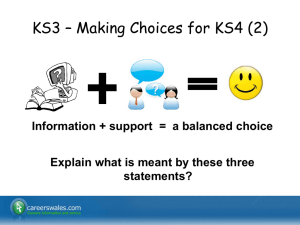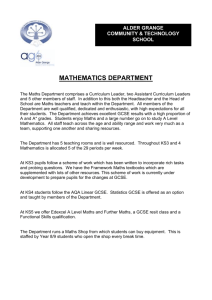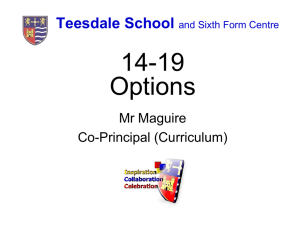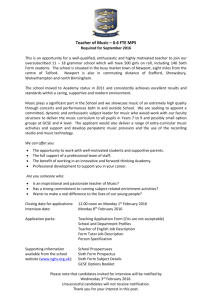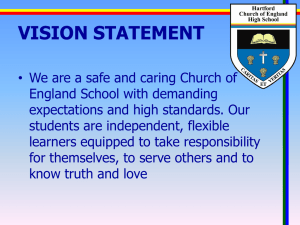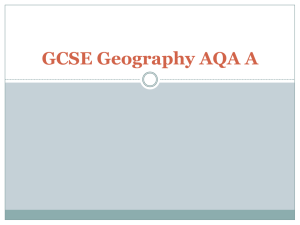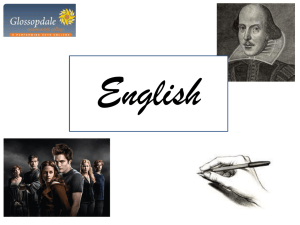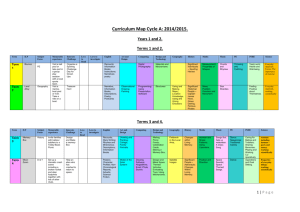Curriculum Policy - Clitheroe Royal Grammar School
advertisement
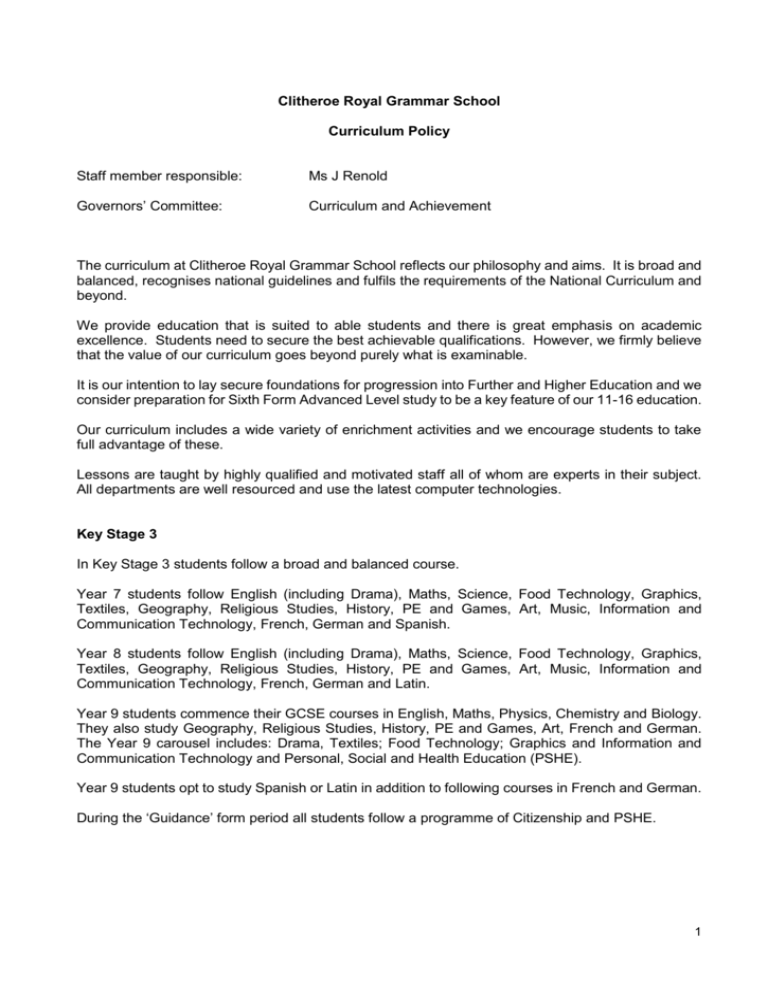
Clitheroe Royal Grammar School Curriculum Policy Staff member responsible: Ms J Renold Governors’ Committee: Curriculum and Achievement The curriculum at Clitheroe Royal Grammar School reflects our philosophy and aims. It is broad and balanced, recognises national guidelines and fulfils the requirements of the National Curriculum and beyond. We provide education that is suited to able students and there is great emphasis on academic excellence. Students need to secure the best achievable qualifications. However, we firmly believe that the value of our curriculum goes beyond purely what is examinable. It is our intention to lay secure foundations for progression into Further and Higher Education and we consider preparation for Sixth Form Advanced Level study to be a key feature of our 11-16 education. Our curriculum includes a wide variety of enrichment activities and we encourage students to take full advantage of these. Lessons are taught by highly qualified and motivated staff all of whom are experts in their subject. All departments are well resourced and use the latest computer technologies. Key Stage 3 In Key Stage 3 students follow a broad and balanced course. Year 7 students follow English (including Drama), Maths, Science, Food Technology, Graphics, Textiles, Geography, Religious Studies, History, PE and Games, Art, Music, Information and Communication Technology, French, German and Spanish. Year 8 students follow English (including Drama), Maths, Science, Food Technology, Graphics, Textiles, Geography, Religious Studies, History, PE and Games, Art, Music, Information and Communication Technology, French, German and Latin. Year 9 students commence their GCSE courses in English, Maths, Physics, Chemistry and Biology. They also study Geography, Religious Studies, History, PE and Games, Art, French and German. The Year 9 carousel includes: Drama, Textiles; Food Technology; Graphics and Information and Communication Technology and Personal, Social and Health Education (PSHE). Year 9 students opt to study Spanish or Latin in addition to following courses in French and German. During the ‘Guidance’ form period all students follow a programme of Citizenship and PSHE. 1 Key Stage 4 At the end of Key Stage 3 students select their GCSE courses. All Year 9 students are interviewed by a member of SLT or their Head of Year to help guide them about their GCSE options. Advice is given to ensure that the mix of courses taken by each student is balanced, leaving open maximum options for the Sixth Form and future career choice. The GCSE examinations are completed at the end of Year 11 and include a core of: English Literature; English Language; Mathematics; Physics, Chemistry and Biology (as 3 separate GCSEs); one Humanity subject, chosen from Geography, History and Religious Studies; one Modern Foreign Language (MFL), chosen from French, German or Spanish. Students also choose 3 GCSEs from the following optional subjects. They are given a free choice and every effort is made to meet those choices. Classical Civilisation, Latin, Art, Music, Drama, Textiles, Food Technology, Resistant Materials, Graphics, Physical Education, Information and Communication Technology, Computer Science, Geography, History, Religious Studies, French, German and Spanish. Students achieve 11 full GCSE qualifications in total. Some departments may take the opportunity to enter students for modules throughout KS4. In addition, students follow non-examination courses in PSHE, Citizenship, Physical Education and Religious Studies. In KS3 and KS4 the PSHE and Citizenship programme includes the following themes: Learning to Learn, Personal Finance, Living in the Wider World, Health and Wellbeing, Managing Change, Relationships, Rights and Responsibilities and Democracy and Justice. Please see the PSHE and Citizenship Programme for Study for further details. Key Stage 5 In the Sixth Form students choose from 27 different A Level courses. Students study 4 subjects to AS Level in Year 12 and continue with 3 or 4 of these in Year 13. Generally, AS examinations will be taken in all subjects at the end of Year 12. A2 examinations will be taken at the end of Year 13. In addition, all students take AS General Studies in Year 12 continuing to A2 in Year 13. A number of students also take Critical Thinking. From September 2015, the new A Levels will be linear, ie assessment of a student’s knowledge and understanding will take place at the end of two years. Students will still be able to take an AS examination at the end of Year 12, but this will no longer contribute to their A Level final grade. Only some subjects will be changing from 2015, others will change from 2016 or 2017 (see below). New specifications for the following courses commence from September 2015: Art and Design Business Studies Computer Science Economics English (Language, Literature, Language and Literature) History 2 Psychology Sciences (Physics, Chemistry, Biology) Sociology The following subjects will change from September 2016: Design and Technology Drama Geography Languages Latin Maths and Further Maths Music Physical Education Religious Studies The dates for the remaining subjects will be confirmed shortly. The Extended Project Qualification is also on offer, leading to the AQA Baccalaureate if the students also complete the associated enrichment activities. Students benefit from studying their own individual project in depth and having to present their findings and evaluations to an audience. In addition, students can choose to study General Studies in Year 13. The majority of the Sixth Form proceed to degree courses in universities including Oxford and Cambridge. Sixth Form students are encouraged to develop responsibility for their own learning, a skill crucial for those moving on to Higher Education and the world of work. The curriculum is completed by a programme of guidance and enrichment activities. Students are guided by their Form Tutors in a weekly timetabled session and on a one-to-one basis by their Senior Tutor. The core enrichment activities undertaken by all students are work shadowing, the Management Conference and the Religious Education Conference. There are many more optional opportunities in sport, music, drama, debating, overseas visits and exchanges, one-off competitions and beginner courses in languages such as Mandarin Chinese, Russian and Italian. Sixth Form students are strongly encouraged to take advantage of the many opportunities on offer. Monitoring and review This policy will be monitored by the Assistant Headteacher overseeing curriculum development. It will be reviewed annually. Date of last review: Date of approval by Governors: Date of next review: September 2015 November 2015 November 2016 3
